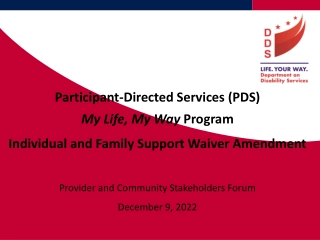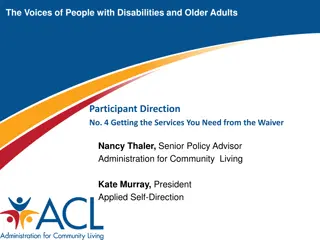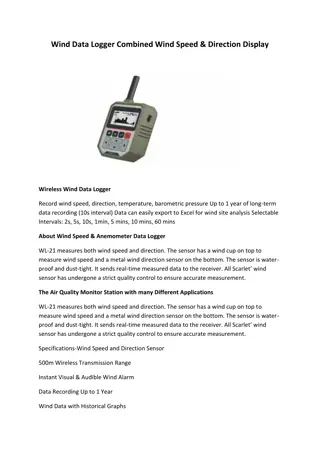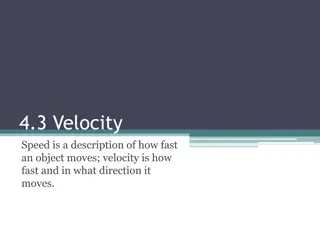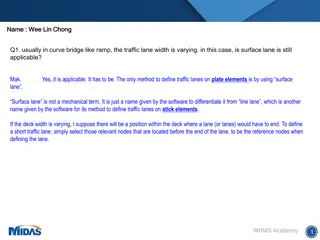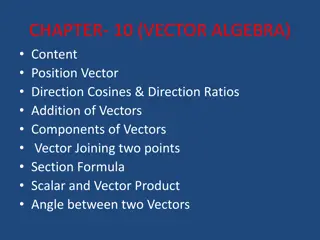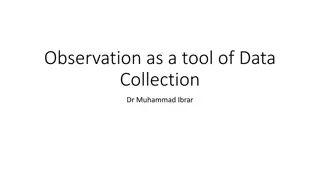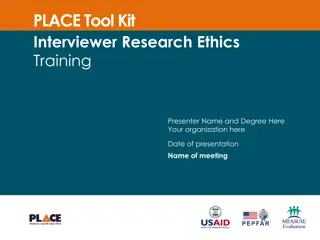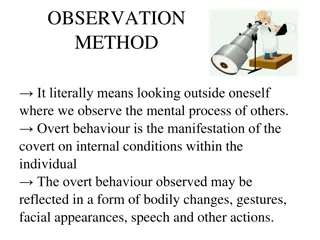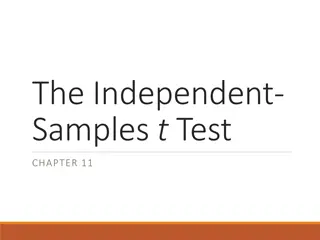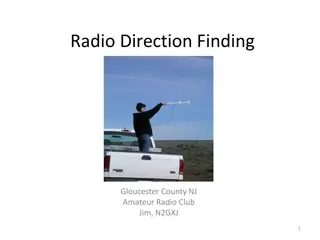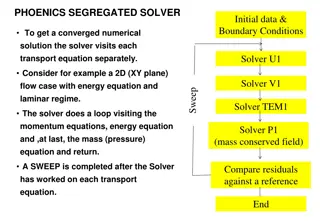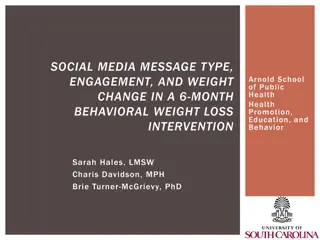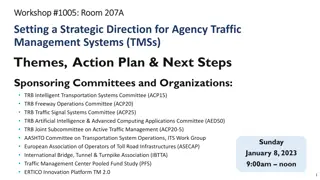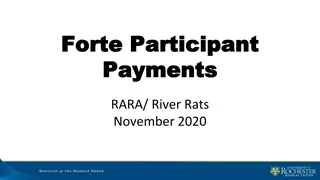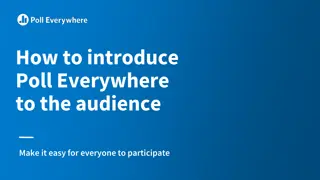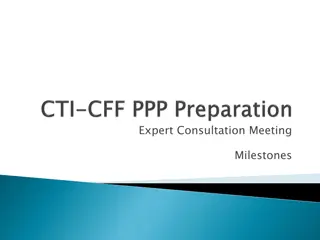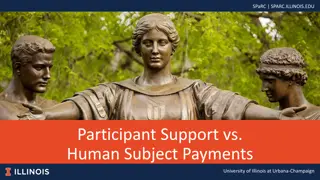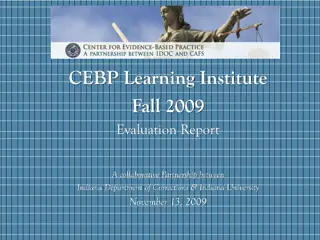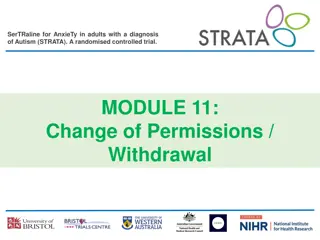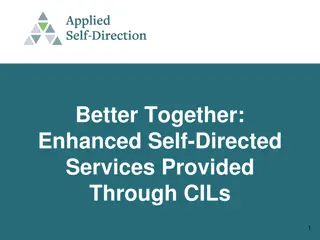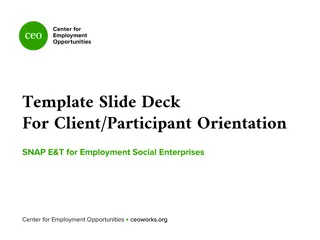Participant-Directed Services (PDS)
The new service option, Participant-Directed Services (PDS), in the Individual and Family Support (IFS) Waiver. PDS offers district residents enrolled in the IFS Waiver the opportunity to have more choice, control, and flexibility over the services they receive, allowing them to live in their natura
1 views • 20 slides
Scale Based Regulation 2023 - Non-Banking Financial Company (NBFCs)
On October 19, 2023, the Reserve Bank of India (\u201cRBI\u201d) has issued \u2018Master Direction \u2013 Reserve Bank of India (Non-Banking Financial Company \u2013 Scale Based Regulation) Directions 2023\u2019 (\u2018SBR Master Direction\u2019). The SBR Master Direction aims to harmonize the Previ
0 views • 9 slides
Comprehensive Guide to Workshop Organization and Implementation
Workshops play a crucial role in developing psychomotor skills and practical knowledge in education. Defined as a group of individuals meeting to enhance skills through study, research, and practice, workshops involve active participant involvement and focus on practical experiences. Essential featu
1 views • 15 slides
Navigating Medicaid Waiver Application for Home and Community Based Services
Delve into the essential aspects of the Medicaid Waiver Application related to participant direction in this informative webinar session. Learn about key considerations, including service provisions, safeguards, and the importance of following HCBS rules to ensure quality care for individuals with d
2 views • 26 slides
Understanding Three-Dimensional Geometry Concepts in Mathematics
Explore the concepts of three-dimensional geometry in mathematics, including direction angles, direction cosines, direction ratios, and equations of lines in space. Learn how to find direction cosines and ratios of a line and understand the properties of X, Y, and Z axes. Gain insights into the uniq
1 views • 15 slides
Wind Data Logger Combined Wind Speed & Direction Display
\nWireless Wind Data Logger\n\nRecord wind speed, direction, temperature, barometric pressure Up to 1 year of long-term data recording (10s interval) Data can easily export to Excel for wind site analysis Selectable Intervals: 2s, 5s, 10s, 1min, 5 mi
1 views • 2 slides
Understanding Velocity vs. Speed in Physics
Velocity and speed are fundamental concepts in physics that describe how fast an object is moving and in what direction. While speed is a scalar quantity representing the rate of motion, velocity is a vector quantity that includes both speed and direction. Constant velocity implies steady speed and
0 views • 8 slides
Understanding Angles and Turns in Year 3 and 4 Mathematics
Explore the concept of angles as a measure of a turn in Year 3 and 4 mathematics. Learn to describe the direction of a turn, understand how angles are created, and identify patterns related to angles and turns. Engage in activities to practice recognizing and describing angles, as well as determinin
1 views • 20 slides
Understanding Resolutions and Triangle of Forces in Physics
Resolutions of forces involve breaking down a force into components, while the Triangle of Forces explores how forces interact in equilibrium. By analyzing graphical and mathematical representations, you can determine the resultant force and its direction using trigonometric functions. Applying the
1 views • 11 slides
Understanding Traffic Lane Width Variation in Curve Bridge Design
In curve bridge design, traffic lane width may vary, requiring proper consideration of surface lanes for defining traffic lanes. Non-square elements, like triangular plates, may be used at deck ends due to geometric limitations. Different mesh local axes may be needed for square and non-square eleme
0 views • 15 slides
Forces Affecting Air Movement: Pressure Gradient Force and Coriolis Force
The pressure gradient force (PGF) causes air to move from high pressure to low pressure, with characteristics including direction from high to low, perpendicular to isobars, and strength proportional to isobar spacing. The Coriolis force influences wind direction due to the Earth's rotation, making
0 views • 20 slides
Understanding Vector Algebra and Its Applications
Explore the fundamentals of vector algebra, including position vectors, direction cosines, direction ratios, vector addition, scalar product, vector product, and more. Learn about the dot product, cross product, and the angle between two vectors. Visual aids and examples help clarify key concepts in
0 views • 18 slides
Understanding DC Motors: Principles and Operations
The introduction to DC motors covers the types of DC machines, such as generators and motors, and explains how they convert energy. By exploring the force on a current-carrying conductor in a magnetic field, the principles behind DC motor operation are clarified. The magnitude and direction of force
0 views • 20 slides
Enhancing Recruitment and Retention Strategies in Research Settings
This content delves into the challenges and approaches in recruitment and retention processes for research studies. It covers topics such as review of recruitment tools, engagement in discussions on effective practices, utilization of mass mailings and social media for participant recruitment, and m
2 views • 19 slides
Understanding Observation as a Data Collection Tool in Behavioral Science
Observation method serves as a crucial tool for data collection in behavioral science, enabling researchers to systematically record and analyze observable phenomena. This method involves recording behavior patterns without direct interaction, providing in-depth insights into natural settings and in
0 views • 12 slides
Three-Dimensional Geometry: Direction Cosines and Angles
Understanding direction cosines and angles in three-dimensional geometry is crucial for determining the orientation of lines in space. By calculating direction cosines, we can find the angles a line makes with the positive directions of the X, Y, and Z axes. This knowledge helps in various geometric
0 views • 18 slides
Understanding Research Ethics: Principles and Application
Research ethics play a crucial role in safeguarding the rights of individuals involved in research activities and maintaining the integrity of the scientific process. This presentation covers the fundamental principles of research ethics - respect for persons, beneficence, and justice - along with p
0 views • 10 slides
Understanding Observation Methods in Psychology
Observation method in psychology involves looking outside oneself to observe the mental processes of others. It includes types such as participant and non-participant observation, structured and unstructured observation. Steps in the process include planning, execution, interpretation, and reporting
2 views • 10 slides
Understanding Independent Samples t-Test in Statistical Analysis
The independent samples t-test is used to compare means in a between-groups design where each participant is in only one condition. It involves sets of participant scores that are independent, meaning they are completely unrelated to each other. This test helps to determine if there is a significant
1 views • 32 slides
Important Changes and Guidelines in Year 4 Program
In Year 4, significant changes have been made to the counting of participant contact hours, with a focus on the WIOA methodology and maintaining participant status. The emphasis is on the period of participation within the TEAMS framework, with orientation hours being distinct from direct contact ho
2 views • 29 slides
Fascinating World of Radio Direction Finding (RDF) Through History
Explore the intriguing world of Radio Direction Finding (RDF), an essential technique for determining the direction of radio signals. From its origins with Heinrich Hertz in 1888 to its pivotal role in military operations during WWI and WWII, RDF technology has evolved over the years while still rel
9 views • 23 slides
Efficient Solver Techniques in CFD Simulations
This resource provides insights into the segregated solver approach in computational fluid dynamics (CFD) simulations, specifically focusing on the sweeping direction and its impact on computational efficiency and convergence rates. It discusses the benefits of employing the XY plane for 2D cases to
1 views • 50 slides
Managing Participant Support Costs for Undergraduate Research Experiences (REU)
Participant support costs for REU programs include stipends, travel allowances, and registration fees for non-employee participants. The Uniform Guidance outlines guidelines for allowable costs, while NSF provides stipend guidelines. Institutions like Brown University have specific procedures for st
0 views • 6 slides
Impact of Social Media Message Types on Participant Engagement in a 6-Month Behavioral Weight Loss Intervention
This study explores whether different types of social network messages influence participant engagement and how engagement with social media affects weight loss outcomes in a 6-month behavioral weight loss intervention. The intervention includes orientation sessions, diet information, recipe books,
0 views • 22 slides
Enhancing Participant Experience at Gliding Club Workshop
Explore the participant experience at a gliding club workshop through activities, personas, and journey mapping. Identify pain points and best practices to ensure a great day for all involved. Meet various participants like Sally Spinbetter and understand their activities, interactions, and recommen
0 views • 11 slides
Bountiful Elementary Musical Registration Information
Registration details for the Bountiful Elementary school musical, including participant information, payment options, volunteer requirements, and character descriptions. Parents/guardians need to fill out separate forms for each child, specify T-shirt sizes, and commit to volunteering for a minimum
0 views • 6 slides
Strategic Direction for Agency Traffic Management Systems Workshop
Workshop #1005 in Room 207A focused on setting a strategic direction for Agency Traffic Management Systems (TMSs) with sponsoring committees from various organizations. The workshop discussed opportunities to consider TMS strategic direction, improvements, and resource needs in agency processes and
0 views • 10 slides
Transitioning to Forte Participant Payments for Clinical Research
Transition from Bank of America to Forte Participant Payments managed by CTSI Office of Clinical Research. Efficient payment methods like debit card, direct deposit, and checks available. Training for Study Coordinators and Finance roles provided. Access system easily via online setup.
0 views • 8 slides
Attendance Tracking for Heads Up Program in Uganda
This document provides a structured format for tracking participant attendance at the Heads Up Program in Uganda. The form includes sections for participant names, activity dates, and checkboxes to mark attendance. It aims to monitor the participation of women, adolescent girls, and young men in var
0 views • 15 slides
Introducing Poll Everywhere for Interactive Audience Engagement
Easily engage your audience with Poll Everywhere using these steps for seamless activity preparation, presentation, and participant involvement. Learn how to create and test activities, customize instructional scripts, and provide clear guidelines for responsive web and SMS voting. Utilize presentat
0 views • 8 slides
Expert Consultation Meeting Milestones and Activities Summary
In preparation for the expert consultation meeting, various activities such as internal meetings, invitation coordination, formal invitation letters, RSVP management, participant arrival logistics, and quarterly reporting were meticulously planned and executed. Key milestones included finalizing TOR
0 views • 9 slides
Participant Rights and Responsibilities Guidance
Ensure every participant understands their rights and responsibilities by providing and explaining the Rights and Responsibilities form. Offer forms in multiple languages and verbally review key points on the form to build trust. Encourage questions and discussions to clarify any confusion.
0 views • 8 slides
Understanding Participant Support and Human Subject Payments at University of Illinois
Definitions and details regarding Participant Support Costs (PSC) and Human Subject Payments at the University of Illinois at Urbana-Champaign, including examples of expenses covered, charging mechanisms, and account codes. Learn about the differences between support for participants and remuneratio
0 views • 14 slides
CEBP Learning Institute Fall 2009 Evaluation Report
Evaluation report of the Fall 2009 CEBP Learning Institute, a collaborative partnership between Indiana Department of Corrections and Indiana University. The report highlights the goal of providing community corrections officials with tools to implement evidence-based practices. It includes feature
0 views • 18 slides
Ethical Aspects of Informed Consent in Clinical Trials
Understanding the ethical foundation of informed consent in clinical trials is crucial for ensuring participant protection, autonomy, and decision-making. Key historical milestones and guidelines have shaped the requirements for obtaining informed consent, emphasizing the importance of voluntary par
0 views • 18 slides
Managing Participant Withdrawal in Autism Study: Key Procedures
This training module details important procedures for withdrawing participants from medication and questionnaires in a study focused on treating anxiety in adults with autism. Participants are allowed to withdraw for any reason at any time, with recommended guidance on medication discontinuation and
0 views • 29 slides
Financial Management Update Meeting Highlights
Today's agenda at the SPA/SPAC update meeting covered various financial services updates, including revisions to participant payment procedures, year-end updates, joint updates, reorganizations, recent agency issues, and more. Focus was also on study participant payment procedures, FY16 year-end dea
0 views • 41 slides
IEEE 802 LMSC 135th Plenary Session - Participant Guidelines and Ethics
Participant behavior in IEEE-SA activities is guided by the IEEE Codes of Ethics and Conduct, emphasizing integrity, responsible behavior, fair treatment, and independent decision-making. Adherence to these principles is essential in ensuring a balanced and inclusive standards development process.
0 views • 30 slides
Self-Directed Services: Empowering Participants Through CILs
Enhance self-directed services by empowering participants to make choices and control their services through Centers for Independent Living (CILs). The Applied Self-Direction team collaborates with programs to provide training and support for maximizing participant autonomy. ILRU at TIRR promotes in
0 views • 29 slides
Client/Participant Orientation for ESE Employment Social Enterprises
Guide and template for developing orientation materials for participants in SNAP E&T programs at the Center for Employment Opportunities. Includes information on program goals, components, enrollment process, and participant rights. Utilize this presentation to enhance client understanding of ESE se
0 views • 17 slides
